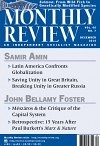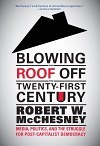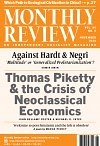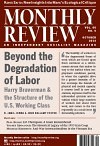Political Economy
Had Marx written Capital in the early twenty-first century, knowing what he could not discern in 1867—that the global dominance of capital, through the military and imperialism, would be realized by the United States—this is the book he may have written using the methodology he developed in the mid-nineteenth century.… What Walter Johnson desires is to change entirely the way we think about the history of the United States, particularly the development of capitalism. He also wants to change how we think about the application of dialectical materialism to the United States. Like Marx, Johnson marshals thick description to disclose the theses that emerge. | more…
Chris Bambery’s splendid People’s History builds upon the scholarly work of others across several generations…. In Bambery’s careful telling, the decisive moment in anything like modern Scottish history comes several hundred years ago. The Scots’ real capitalism spread through the savage process of depopulation that Marx described so brilliantly in Capital: enclosure. Over extended decades, thousands of historic villages were literally emptied, so much so that remnants of crude huts can still be found in areas that have fewer inhabitants than sheep. The distinct language, created over thousands of years and retained with great effort in Wales, and with less effort in the rural districts of Ireland, did not need to be crudely suppressed here: the victims, pushed into the cities when not driven to early deaths, seem to have lost everything in this later period but their colorful, characteristic Scottish accents. | more…
Contradictions of the Digital Economy
We have now entered a period…when new waves of commodification set in motion in earlier periods are reaching maturity. The new commodities have been generated by drawing into the market even more aspects of life that were previously outside the money economy, or at least that part of it that generates a profit for capitalists. Several such fields of accumulation have now emerged, each with a different method of commodity genesis, forming the basis of new economic sectors and exerting distinctive impacts on daily life, including labor and consumption. They include biology, art and culture, public services, and sociality. | more…

Ursula Huws ties together disparate economic, cultural, and political phenomena of the last few decades to form a provocative narrative about the shape of the global capitalist economy at present. She examines the way that advanced information and communications technology has opened up new fields of capital accumulation: in culture and the arts, in the privatization of public services, and in the commodification of human sociality by way of mobile devices and social networking. These trends are in turn accompanied by the dramatic restructuring of work arrangements, opening the way for new contradictions and new forms of labor solidarity and struggle around the planet. | more…

In 1832, when the global cholera pandemic was approaching Manchester—as a young Frederick Engels was later to recount in The Condition of the Working Class in England (1845)—“a universal terror seized the bourgeoisie of the city. People remembered the unwholesome dwellings of the poor, and trembled before the certainty that each of these slums would become a centre for the plague, whence it would spread desolation in all directions through the houses of the propertied class.” As a result, Engels noted, various official inquiries were commissioned into the condition of the poor. But little was done in the end to combat the social factors that facilitated the spread of the disease.… One can see an analogous situation today in the growing concern that has materialized in the United States and other wealthy nations over the Ebola epidemic in Africa. | more…
Foreword to The Necessity of Social Control
István Mészáros is one of the greatest philosophers that the historical materialist tradition has yet produced. His work stands practically alone today in the depth of its analysis of Marx’s theory of alienation, the structural crisis of capital, the demise of Soviet-style post-revolutionary societies, and the necessary conditions of the transition to socialism. His dialectical inquiry into social structure and forms of consciousness—a systematic critique of the prevailing forms of thought—is unequaled in our time. No less a historical figure than Hugo Chávez referred to him as the “pathfinder” of twenty-first century socialism.… The role of this foreword is to help to put his system of thought as a whole, and this book in particular, in their historical contexts, while illuminating some of the distinctive concepts governing his analysis. | more…

In the United States and much of the world there is a palpable depression about the prospect of overcoming the downward spiral created by the tyranny of wealth and privilege and establishing a truly democratic and sustainable society. It threatens to become self-fulfilling. In this trailblazing new book, award-winning author Robert W. McChesney argues that the weight of the present is blinding people to the changing nature and the tremendous possibilities of the historical moment we inhabit. In Blowing the Roof Off the Twenty-First Century, he uses a sophisticated political economic analysis to delineate the recent trajectory of capitalism and its ongoing degeneration. | more…

On September 20, 2014, while corporate and government officials arrived in New York City for the UN Climate Summit, organizers and activists from around the world participated in a peoples’ summit called the NYC Climate Convergence (organized by the Global Climate Convergence and System Change Not Climate Change). The NYC Climate Convergence featured as the lead keynote speaker Naomi Klein, who presented the analysis of her new book, This Changes Everything: Capitalism vs. the Climate (Simon and Schuster, 2014). Her concluding chapter, significantly, is entitled “Leap Years: Just Enough Time for the Impossible.” Monthly Review readers will be interested that Klein observes in her book: “Karl Marx… recognized capitalism’s ‘irreparable rift’ with the ‘natural laws of life itself’”. Later she refers to “global capitalism’s voracious metabolism”. | more…
Not since the Great Depression of the 1930s has it been so apparent that the core capitalist economies are experiencing secular stagnation, characterized by slow growth, rising unemployment and underemployment, and idle productive capacity. Consequently, mainstream economics is finally beginning to recognize the economic stagnation tendency that has long been a focus in these pages, although it has yet to develop a coherent analysis of the phenomenon. Accompanying the long-term decline in the growth trend has been an extraordinary increase in economic inequality, which one of us labeled “The Great Inequality,” and which has recently been dramatized by the publication of French economist Thomas Piketty’s Capital in the Twenty-First Century. Taken together, these two realities of deepening stagnation and growing inequality have created a severe crisis for orthodox (or neoclassical) economics. | more…

Secular stagnation (or the trend towards long-term slow growth and continuing high unemployment/underemployment) has become a big issue in the mature economies since 2013, when former U.S. Treasury Secretary Larry Summers raised the question at an IMF economic forum. Compilations of work on the subject can now be found on the Internet, such as the one by economists Coen Teulings and Richard Baldwin; which however leaves out all contributions by heterodox economists. Teulings and Baldwin credit Summers with having “resurrected” the secular stagnation issue. But is this true? Only in the sense that he reintroduced it to mainstream neoclassical economics. It has long been a topic on the left, and particularly in Monthly Review, where editor Paul Sweezy explicitly drew attention to the “secular stagnation” question more than forty years ago—with MR tracking the stagnation trend month by month in the four decades that followed.… Isn’t it about time…that orthodox economists, Summers included, began to acknowledge the enormous work done on this topic on the left over decades, and indeed the greater complexity and historicity of the analysis to be found there—not only in MR but within heterodox economics more generally? Such an admission might even do orthodox economists some good. | more…
Braverman and the Structure of the U.S. Working Class
Harry Braverman’s Labor and Monopoly Capital, first published forty years ago in 1974, was unquestionably the work that, in the words of historian Bryan Palmer, “literally christened the emerging field of labor process studies.” In the four decades since its appearance Braverman’s book has continued to play a central role in debates on workers’ struggles within industry, remaining indispensable to all attempts at in-depth critique in this area.… This continuing relevance of Braverman’s analysis has to do with the fact that his overall vision of the transformations taking place in modern work relations was much wider than has usually been recognized. Viewed from a wide camera angle, his work sought to capture the complex relation between the labor process on the one hand, and the changing structure and composition of the working class and its reserve armies on the other. This broad view allowed him to perceive how the changes in the labor process were integrally connected to the emergence of whole new spheres of production, the decomposition and recomposition of the working class in various sectors, and the development of new structural contradictions. | more…
It is not by chance that the very title of this contribution links the return of fascism on the political scene with the crisis of contemporary capitalism. Fascism is not synonymous with an authoritarian police regime that rejects the uncertainties of parliamentary electoral democracy. Fascism is a particular political response to the challenges with which the management of capitalist society may be confronted in specific circumstances. | more…




